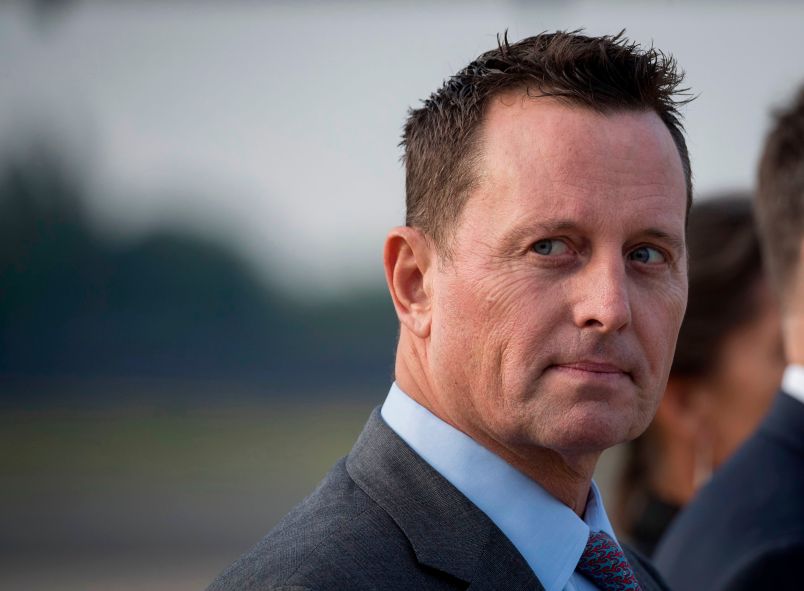Acting Director of National Intelligence Richard Grenell is many things: ambassador to Germany, right-wing provocateur, and Instagram aficionado.
But what may present the biggest problem is his past as a media consultant for foreign political parties, governments, and businesses – and whether that work strayed into being a foreign agent and would have complicated his ability to receive a security clearance.
Former national security officials told TPM that Grenell crossed what has traditionally been seen as a red line: getting paid by foreign clients who are adverse to U.S. foreign policy, and then entering government.
The 53-year-old consultant has made history in being the first director of the nation’s 13 intelligence agencies to have listed a Kazakh-British mining conglomerate as a client.
Grenell also can boast of being the first person in charge of transmitting intelligence to the White House to have penned op-eds to discredit a Moldovan prosecutor who was offering information about corruption allegations involving a client on behalf of that client, and to have worked for a non-profit largely funded by Hungary’s far-right government.
At least these three clients of Grenell’s Los Angeles-based media consulting firm Capitol Media Partners are potentially adverse to U.S. interests. It is unclear the extent to which the clients may fall under the gaze of American intelligence collectors, who Grenell now oversees.
Jeffrey Edmonds, a former Russia director on the National Security Council, told TPM that the clients – and Grenell’s alleged lack of disclosure as a foreign agent – would normally present a bar from his becoming any intelligence official, let alone head of the intelligence community.
“There’s an assessment as to good judgment, can you be trusted with secrets, source materials,” Edmonds said. “And if you have a propensity for breaking the law or not disclosing things, that’s problematic.”
“That’s one of the biggest things upon entering the intelligence community – they want to know if you’re in a good position to disclose things to them,” he added. “And if you’re in a habit of hiding things or not declaring things, that suggests you’re not to be trusted with sensitive information.”
Globetrotter
Grenell wrote a series of columns and made media appearances in 2016 agitating against the enemies of a Moldovan political party called the Democratic Party of Moldova.
That party was led by Vlad Plahotniuc, a Moldovan oligarch who was banned from entering the U.S. last month over corruption allegations.
ProPublica reported on Friday that Grenell was working for Plahotniuc and the political party through a separate engagement with Arthur Finkelstein, a longtime GOP consultant who is now deceased. On his financial disclosure, Grenell wrote that Finkelstein’s firm had paid him more than $5,000 for unspecified consulting work at his company.
Grenell did not register as a foreign agent as per the Foreign Agents Registration Act. An attorney for Grenell has argued that he had no obligation to register.
To David Laufman, a former head of the DOJ’s counterintelligence section, Grenell’s past with foreign clients was extremely unusual.
“There are people who aspire to be in government or to return to government who forego taking on foreign business entanglements because they don’t want to complicate their ability to get a security clearance,” Laufman, who is now in private practice, told TPM. “It’s not a legal bar, but it can be a complication.”
TPM has unearthed other apparent foreign clients of Grenell.
Archived, 2011-2013 versions of Capitol Media Partners’ website show that it listed the country of Somalia and a publicly traded British company called the Eurasian Natural Resources Corporation (ENRC) as clients. Grenell has boasted of having Somalia as a client in other fora, but it appears to be the only mention of ENRC.
The company – then publicly traded but since partly owned by Kazakh billionaire Aleksandr Mashkevitch – waded into controversy at the time that Capitol Media Partners listed it as a client over a deal it struck with an Israeli diamond magnate to purchase a series of Congolese mining firms.
The UK’s Serious Fraud Office opened an investigation into ENRC over allegations of corruption in the deal in 2013, which has yet to conclude. The U.S. sanctioned the Israeli billionaire over his Congolese dealings in June 2018.
The scope of Grenell’s work for ENRC is unclear. Alan Morgan, an outside media consultant to which ENRC referred TPM, did not reply to requests for comment.
But to Edmonds, the former NSC staffer, his work created “a bizarre situation.”
“The question is, does it affect your judgment?” Edmonds said. “If there’s a situation where the intelligence is damning to people that you used to work with, does that become a problem?”
Grenell has also attracted scrutiny due to his work on behalf of the Magyar Foundation of North America – a U.S. nonprofit funded almost entirely by the Hungarian government.
The organization’s tax filings show that it paid Capitol Media Partners $103,750 for “public relations” work. Atlaszo, a Hungarian news organization, reported in 2018 that the foundation was financed and directed by the country’s right-wing government.
Grenell’s work for the foundation was first reported by the Quincy Foundation, a D.C.-based foreign policy think tank funded by billionaires George Soros and Charles Koch.
Under the government of Viktor Orban, Hungary has been criticized for clamping down on its political opposition and invoking anti-Semitic tropes.
But more broadly, Grenell’s work further puts in relief the question mark over his new role at DNI.
“Are you still able to give an objective analysis to the President when it’s your buddies?” Edmonds asked. “It’s not a done deal, but would certainly raise a lot of red flags.”
This article has been corrected to reflect that Charles Koch finances the Quincy Foundation.






